Blog > 15 Bedtime Rituals for a Productive 2024 [Backed by Science]
Blog > 15 Bedtime Rituals for a Productive 2024 [Backed by Science]
In our tech-focused and the fast-paced modern world, distractions are plentiful. It seems we are always looking for ways to be more productive and focused. For many, this is more difficult than it sounds. Since the COVID-19 pandemic hit earlier in 2020, many businesses and workers have had to adapt to working at home where distractions are plentiful. These distractions often led to unproductive days.
On top of all of this, working from home has severely disrupted the sleep patterns of millions of workers. One study found that out of 2,000 remote workers, 70% had experienced disrupted sleep patterns. If your home is now your office, you probably have firsthand experience with these sleep disruptions. Stress from the uncertainty of the pandemic combined with working remotely and family/personal demands more often than not cause sleep problems that turn into unproductive days.
We all know that poor sleep is bad for our health, relationships, and work. If you want to turn the tide and adjust your nighttime routine to help you stay more productive, here are 15 bedtime rituals for insanely productive days.
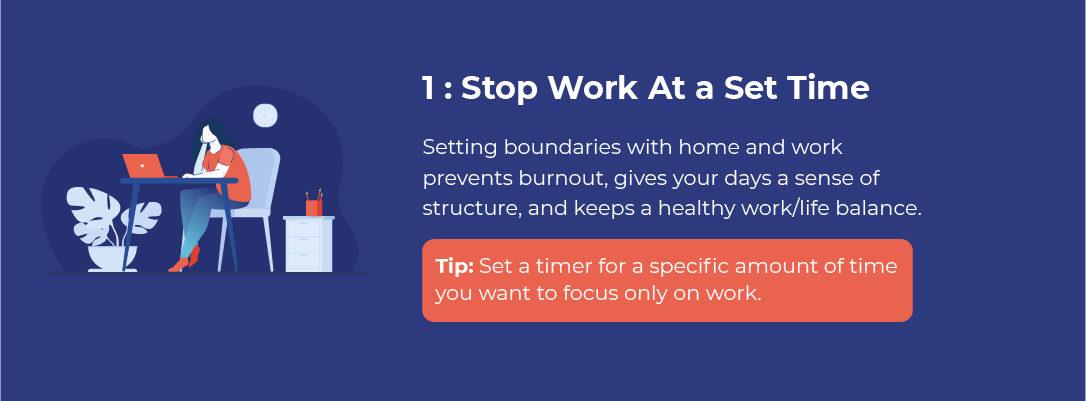
With your bedroom or kitchen suddenly becoming your office, setting boundaries between work and your personal life can be difficult, if not impossible. Having a healthy work-life balance is key to productivity and personal happiness. Stopping work at a certain time each day gives your days a sense of structure and prevents burnout.

It can be tempting to scroll through your social media feeds before bed, or refresh your work inbox one last time before calling it a night. Your nighttime scroll and email check can end up costing you valuable sleep time. Studies show those who check social media 30 minutes before bedtime are 1.5 times more likely to have disrupted sleep than those who don’t. For a productive day ahead, ignore your Twitter feed before bed.

Many of us use caffeine to help us stay productive during the day, but as the day turns to night, our afternoon Starbucks run can leave us up past our bedtime. Consuming caffeine up to 6 hours before bedtime can cause up to an hour or more of lost sleep per night. For a productive day, stick to your morning cup of joe.

Besides eating healthy and getting quality sleep, exercising is the best thing you can do for your health. Exercise promotes restful sleep by helping regulate your sleep/wake cycle, especially if you work out in the morning.
Studies show that working out in the morning or in the afternoon helps regulate your sleep/wake cycle and leads to deeper sleep. Exercise during the daylight hours helps boost melatonin levels and serotonin, leading to improved mood during the day and better sleep at night.
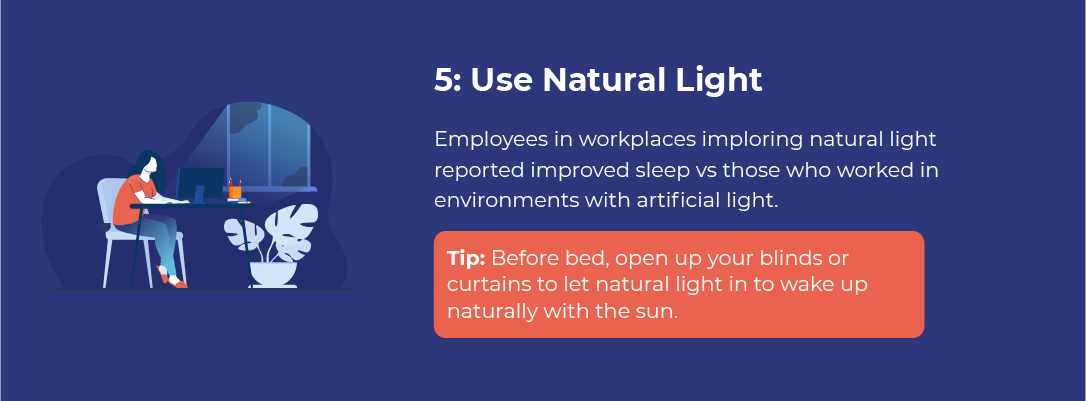
Nothing boosts your mood like a sunny day–good moods usually equal more productive days. While most of us would agree, science does, too. Exposure to natural light during the way boosts mood, provides Vitamin D, which is vital to energy production, and regulates circadian rhythms.
A study conducted by Northwestern Medicine and the University of Illinois found employees in workplaces imploring natural light reported improved sleep than those who worked in environments with artificial light. The study found that these workers slept 46 minutes longer per night than workers who did not have natural light in their office.
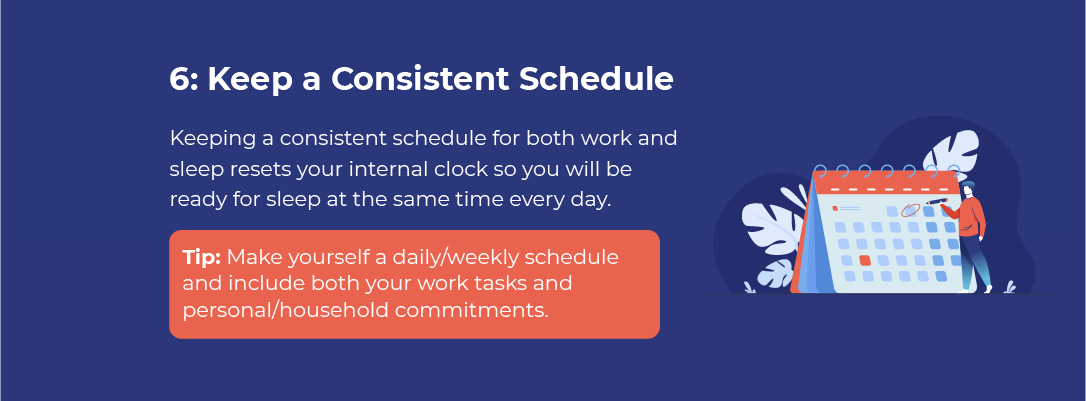
Since millions of workers have transitioned to remote offices and sadly too many workers have lost their jobs due to COVID-19, keeping a consistent schedule has gone out the window. Keeping a consistent schedule for both work and sleep resets your internal clock so you will be ready for sleep at the same time every day. A consistent sleep schedule leads to improved sleep, and in turn, improved productivity.
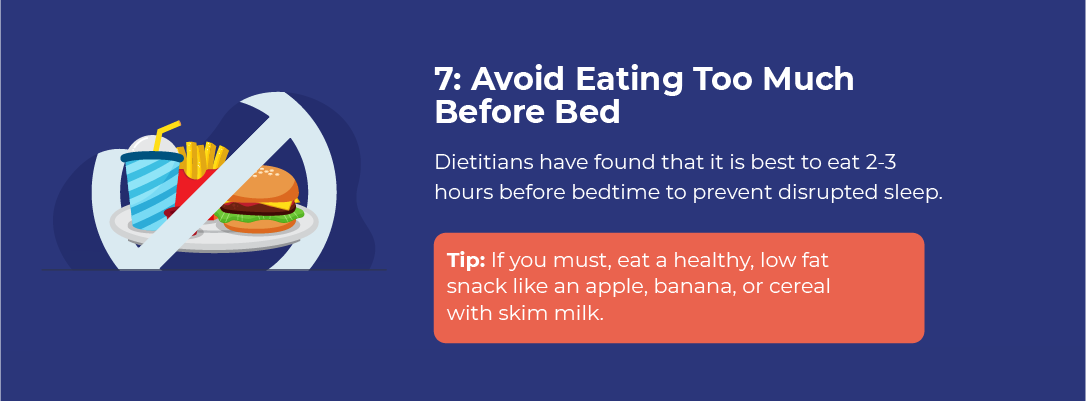
There’s nothing like a tasty midnight snack. However, your nighttime snack can wreck your sleep, leaving you groggy and unproductive the next day. Dietitians have found that it is best to eat 2-3 hours before bedtime to prevent disrupted sleep. If you eat earlier and are up later, studies show it is okay to eat a healthy snack before bed like apples and natural peanut butter.
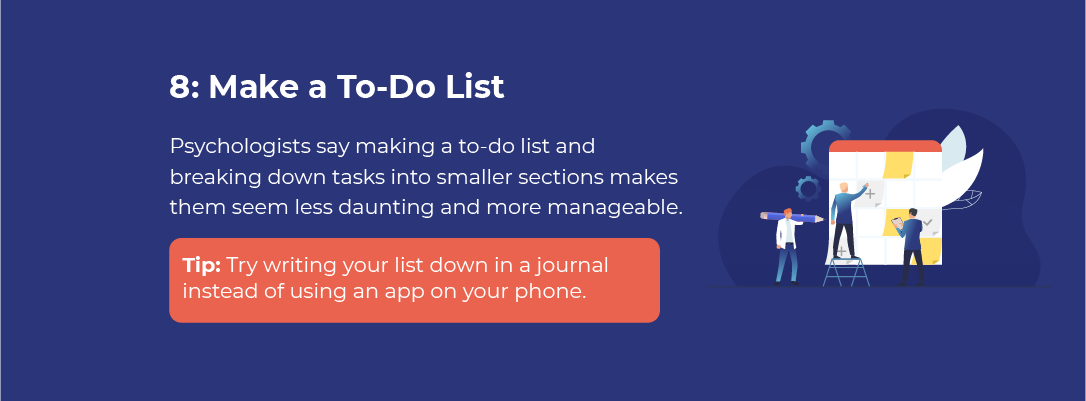
Making a to-do list is one of the best ways to stay on track of your tasks and maintain productivity. Whether you prefer an app on your phone or the old standby pen and paper, making a to-do list might be the key to a productive day.
According to psychologists, making a to-do list and breaking down tasks into smaller sections makes them seem less daunting and manageable. Lists give us structure and provide visual proof of our accomplishments.

A warm cup of chamomile tea before bed is a popular way to wind down and fall asleep. For thousands of years, chamomile has been the to-go herb for sleep and relaxation. The miracle herb has many health benefits, but is primarily used to induce sleep.
A study conducted by Johns Hopkins University found that mothers to newborns who drank chamomile tea had fewer symptoms of inadequate sleep than those who did not drink chamomile tea.
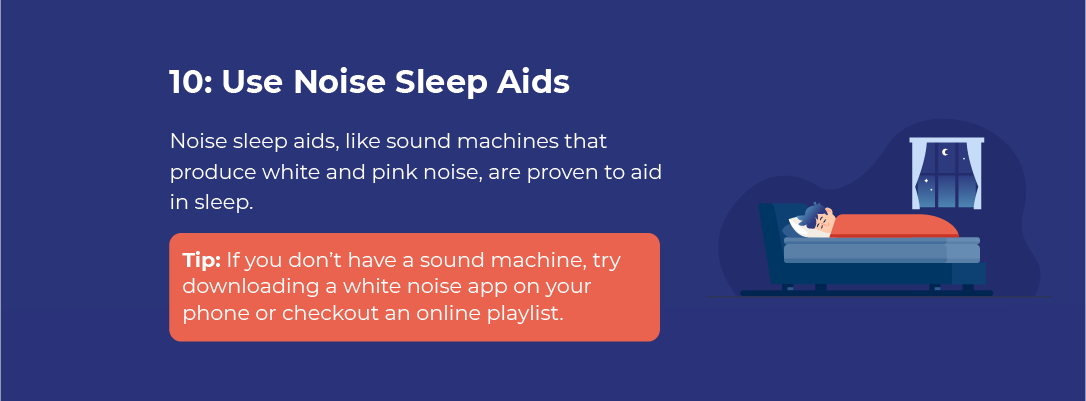
Many people prefer silence during sleep, and the thought of noise while sleeping is unthinkable. However, noise sleep aids like sound machines that produce white and pink noise are proven to aid in sleep.
White noise, like the sound of a fan, air conditioning, or radio/television static, contains sound frequencies at equal intensity levels. This noise sleep aids camouflage louder sounds that stimulate your brain, like dogs barking and traffic.
If you live in a loud neighborhood or city, noise sleep aids can help you get the deep sleep you need for productive days.
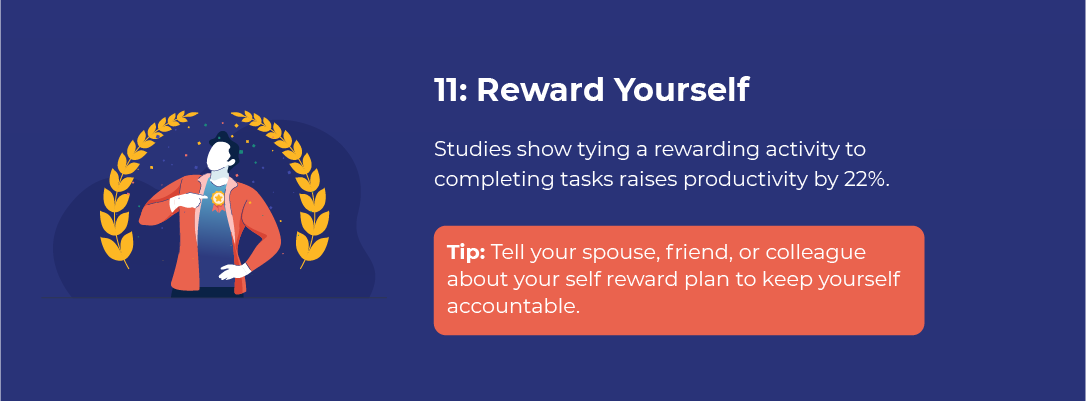
Rewarding yourself for a job well done is a great way to improve your productivity. Next time you are planning a busy, productive day, plan a small reward for yourself to celebrate your accomplishments and marking tasks off your list at the end of the day.
Rewarding yourself harkens back to childhood, but the simple concept works well into adulthood. Studies show tying a rewarding activity to completing tasks raises productivity by 22%.

Clutter breeds chaos and stress. While you might not think a few extra things on your desk will wreck your productivity, science disagrees. There are many studies that connect messy work areas to reduced productivity. INC reports that the average person loses an hour a day looking for missing information.
Also, your co-workers might have some thoughts about your piled-up desk. According to a survey conducted by staffing firm Adecco, out of 1,000 interviewees, 57% judged a colleague based on the cleanliness and organization of their desk. Studies point to organized desks increasing productivity.
To stay on track the next day, organize your workspace before bed to have everything ready for the next day.

If you’ve researched productivity methods in the past few years, you’ve probably heard of time blocking. This method involves setting aside or “blocking off” certain parts of your day to focus on specific tasks.
Time blocking might sound like micromanaging yourself, but this method of breaking up tasks and time is proven to improve productivity and decrease procrastination. Meanwhile, multitasking is proven to cause errors, decreased productivity, and increased distraction.
If you are planning a productive day, make yourself a schedule the day before so you will be ready to go the next morning.
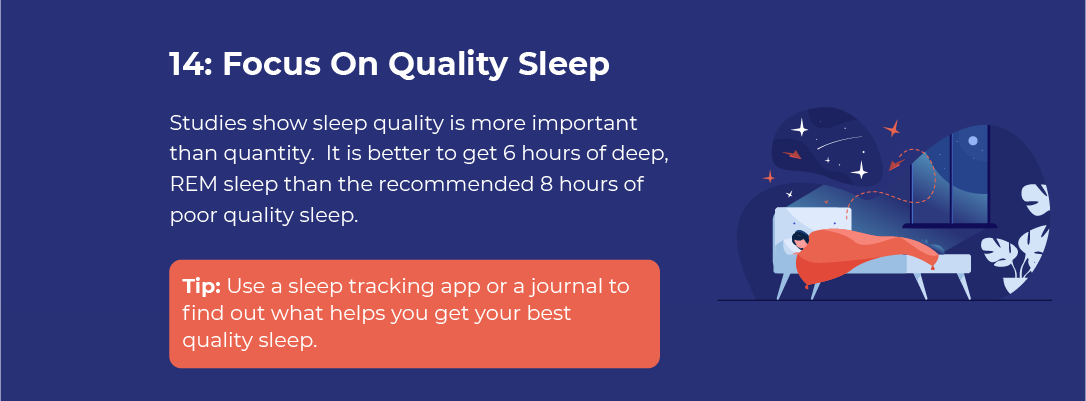
Most of us don’t think about the quality of our sleep but instead focus on quantity. However, science says we should focus on quality rather than quantity. Most of us need about 7-8 hours of sleep for optimal daily functioning. While you might be getting those recommended hours, what about the quality of those hours?
Studies show sleep quality is more important than quantity. Sleep quality is correlated with lifestyle factors like stress, light exposure before bed, and mealtime. Monitoring sleep quality with smartphone apps and devices like the FitBit or Apple watch can give you valuable insight into factors that impact your sleep quality.
To maximize your sleep quality, use a smart device or take notes about your activities before bed and how you feel in the morning. This way, you will know what helps or doesn't help you sleep.
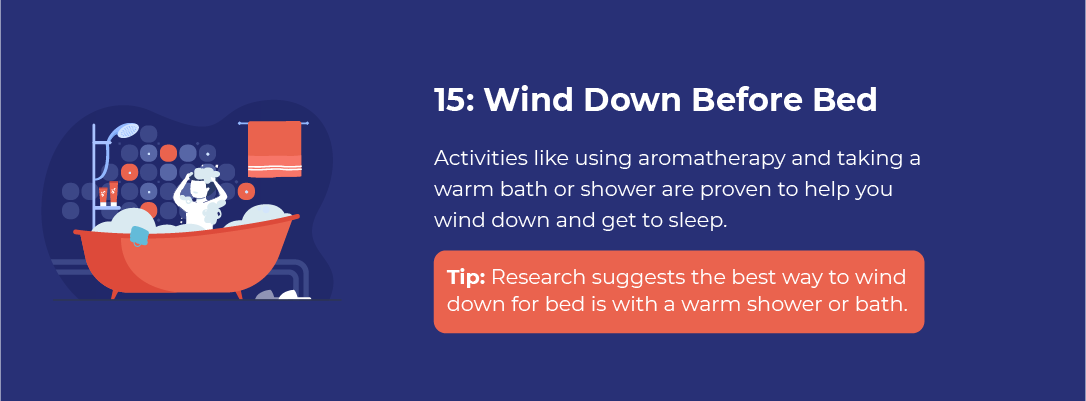
Winding down before bedtime is an important part of the day that is often overlooked. Getting yourself in the right headspace for sleep is just as important as getting actual sleep. Activities like using aromatherapy, taking a warm bath or shower, and avoiding blue light before bed are all proven to help you wind down and get to sleep.

If you are looking for ways to get better, deeper sleep to increase your productivity, try out the above tips to start making a dent in your to-do list. Visit SleePare’s website for even more sleep tips, mattress comparisons, and more!

 Showrooms
Showrooms
Meet The Author:
Shanir Kol
Shanir Kol, founder and CEO of SleePare, pioneered the “Try and Buy” model in eCommerce, enhancing mattress shopping by combining in-store trials with online purchases. Launching in 1999, his company focuses on customer satisfaction and eco-friendly practices, aiming to minimize mattress waste and expand sustainably.